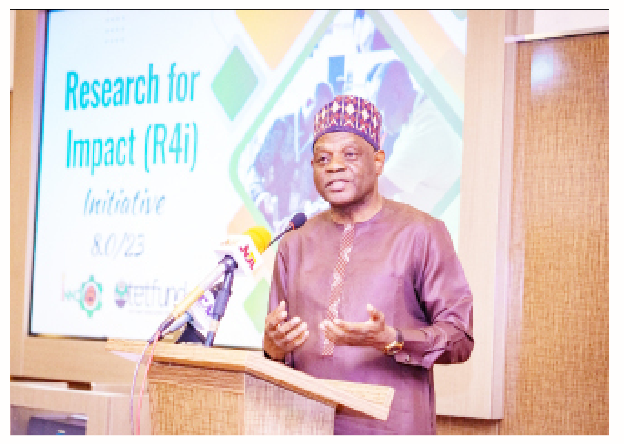Stakeholders in the education sector have warned the Federal Government against any attempt to amend the Tertiary Education Trust Fund (TETFund) Act to accommodate private universities as beneficiary institutions.
Speaking at the 2024 TETFund’s Strategic Planning Meeting in Abuja, President of Academic Staff Union of Universities (ASUU), Professor Emmanuel Osodeke, raised concerns that the National Assembly is under pressure to amend the TETFund Act in order to accommodate private universities in the intervention list.
Osodeke, however, said rather than lobbying to be included in receiving public funds to fund their private businesses, private universities should be compelled to pay education tax to the Federal Government.
“As I am talking to you, there is a threat. I have useful information that they are trying to amend the law and we are waiting for them.
“We all have to work together. And there is a process that is ongoing. And we must ensure that we stop that process by the National Assembly to amend the law of TETFund.”
However, the leadership of the National Association of Nigerian Students (NANS) has also kicked against such a move.
President of NANS, Comrade Lucky Emonefe, said if the claims by the ASUU president is anything to go by, then tertiary education in Nigeria would be in for more trouble.
He warned that the government should not, under any reason, amend the TETFund Act for the purpose of including private universities, saying this would be counterproductive and make nonsense of efforts by the intervention agency to revitalise public tertiary institutions in Nigeria.
Emonefe was in the same wavelength with ASUU when he noted that private universities were private businesses established by well-to-do individuals in the country and, as such, have no basis to be included on the TETFund beneficiary list which keeps increasing by day with establishment of tertiary institutions by the state governments.
The executive secretary of TETFund, Sonny Echono, told stakeholders at the strategic planning meeting that because of the increasing demand and sustained efforts at expanding and increasing the efficiency of collection of the education tax, the Federal Government has increased the tax from 2.5 percent to 3.0 percent in the year 2023.
He said the Fund has refocused and made provision for some new areas of intervention for the Year 2024, adding that this followed pertinent issues and concerns raised by stakeholders at the year 2023 strategic meeting and indeed other workshops organised in the course of the year.
He disclosed that the approved new intervention lines in the Annual Direct Disbursement include the establishment of Career Centres/Unit, in all categories of beneficiary institutions as well as the Institution Based Skills development for Polytechnics.
Echono further stated that in response to popular demands from the Colleges of Education, the teaching practice allocation has been greatly enhanced, while for the Special Direct Disbursements, the Fund has increased the allocation for the Special High Impact Programme (SHIP), and the number of benefitting institutions have also been increased to two per geopolitical zone per category giving a total of 36 beneficiary institutions.
Other areas of Special Direct Disbursement are provision for Hostels using the Public/Private Partnership arrangement, innovation hubs, Disaster Recovery, Security Infrastructure, Completion of abandoned projects and many others.
Speaking on the need not to overburden TETFund, the Rector, Delta State Polytechnic, Otefe-Oghara, Prof Emmanuel Ufuophu-Biri, said the agency is already playing significant role in the provision of infrastructure in public tertiary institutions across the country and undoubtedly a cynosure in the eyes of everybody.
He noted that the intervention agency has been phenomenal in terms of the provision of state-of-the-art infrastructure, facilities and equipment in higher institutions, saying other African countries are under-studying the Nigerian model in the funding of tertiary institutions.
“I have interacted with heads of institutions, vice chancellors, rectors from different parts of the world and when we discuss with them about TETFund, they marvel. Meanwhile, there are some African countries that have said they want to copy the TETFund pattern, he said.
“It is an assistance that will go a long way in helping the beneficiary institutions immensely in every significant area of educational development,” he said.
Executive director of Education Rights Initiative, Dr Solomon Udah, said what the Federal Government needed to do was to provide an enabling environment for privately owned institutions in the country to thrive.
He noted that education is a social service and that those intervening in the sector should be encouraged by freeing them from unnecessary taxations and other encumbrances militating against smooth operation of private institutions in Nigeria.
According to him, the solution is not in including private universities in TETFund intervention
He insisted that the government should find creative ways of supporting private investors in education and not limiting consideration to universities.
We’ve got the edge. Get real-time reports, breaking scoops, and exclusive angles delivered straight to your phone. Don’t settle for stale news. Join LEADERSHIP NEWS on WhatsApp for 24/7 updates →
Join Our WhatsApp Channel










